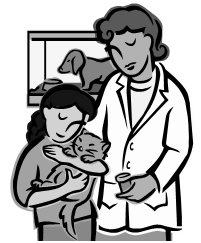
- What pet or pets you wish to include in the trust? This can be done by microchip number, DNA profile, photographs, registration papers or simply a written description along with your pet(s) name(s).
- What type of care do you want for your pet? What specific treatment, emergency care, daily care, grooming, boarding, walking or other services do you want provided for your pet.
- How much money should you use to fund the trust? You need to consider the pet’s life expectancy as well as special needs of the pet in addition to the daily cost of food, shelter, medical services. You may wish to leave sufficient funds for pet insurance.
- Who should be the Trustee? Typically the Trustee is a family member or friend who is familiar with your pet. He or she is in charge of the money, so be certain that this person will look out for the best interest of your pet and treat your pet as if it were a member of his or her family. You may wish to appoint a Caregiver so there will be no conflict of interest with the person who is in charge of the money and the person who is actually caring for your pet.
- Who should be the Caregiver? You may wish to appoint a Caregiver rather than the Trustee to take care of your pet who would be compensated by the Trustee. The ideal situation is if your pet knows the Caregiver. The Caregiver should not be a remainder beneficiary of the Trust so as not to cause any conflict with their care decisions.
- Who should be the Trust Protector? Connecticut law requires that you appoint a Trust Protector. The Trust Protector’s job is to make certain that the Trust assets are being used for your pet. If the Trustee is not doing his or her job the Trust Protector can go to the Probate or Superior Court to enforce its provisions, remove the trustee or order an accounting.
- Who should be the remainder Beneficiary? Someone or some entity should be named to receive any remaining funds when your pet dies. It is better to pay the Trustee and Caregiver rather than have them named as beneficiaries to avoid any conflicts of interest.
- What arrangements should be made when your pet passes away? A final disposition should be planned for your pet upon its death, including instructions for burial, cremation or memorial ceremony.
TAX CONSEQUENCES
Income Tax – Pets are not recognized as trust beneficiaries under federal law. The trust receives no income distribution deduction for distributions and pays income taxes on taxable income. The trust is entitled to deduct the amount of distributable net income paid to the caregiver or Trustee and the Caregiver or Trustee recognizes this taxable income on his or her own income tax return.
Estate Tax – Since Connecticut recognizes a trust for the benefit of a pet, it does not qualify for an estate tax deduction.
Attorney Frances B. Granquist
The Pellegrino Law Firm, P.C.
(203) 787-2225 / [email protected]
